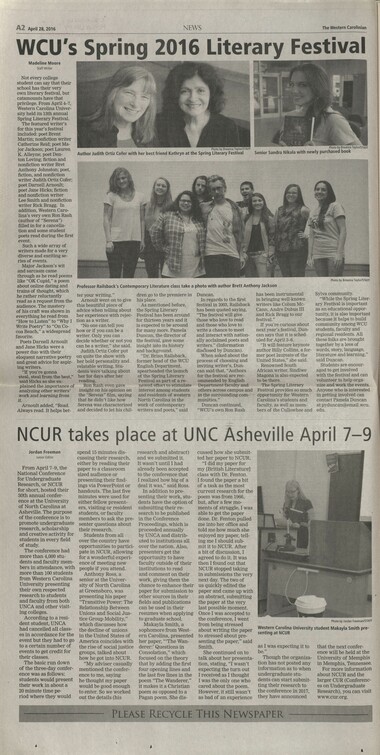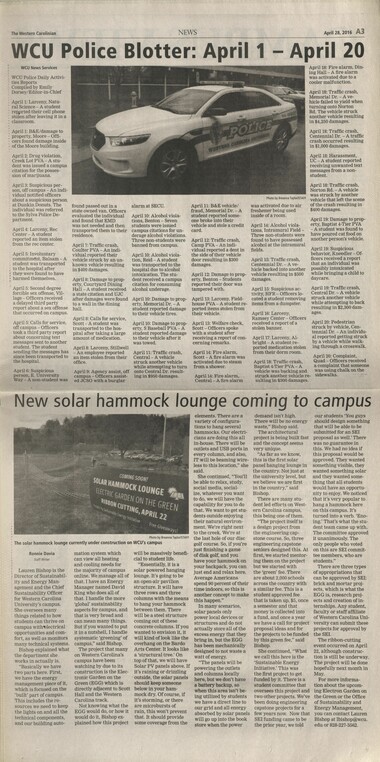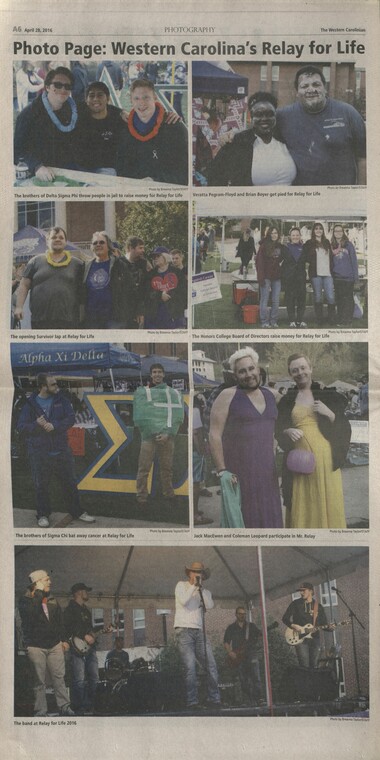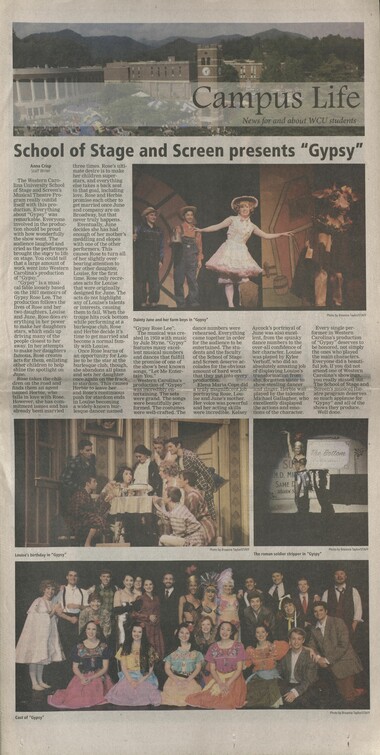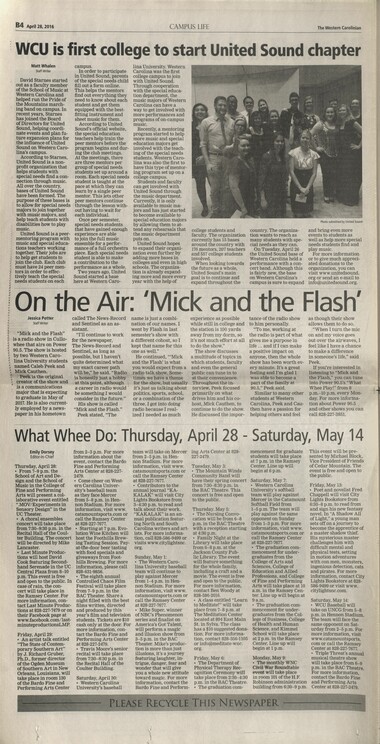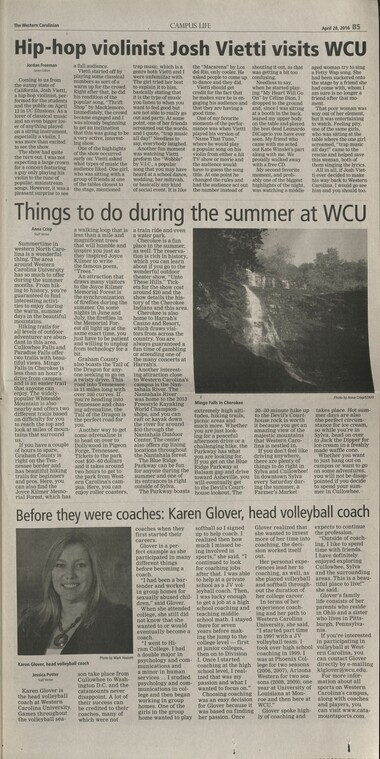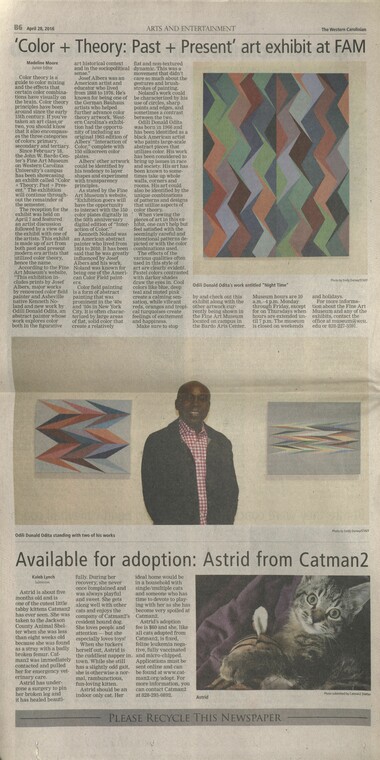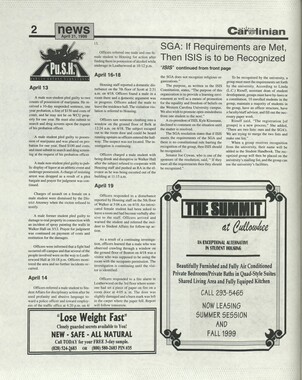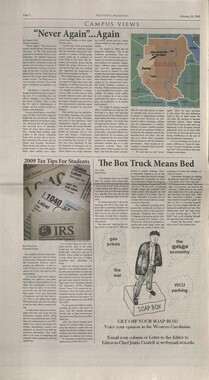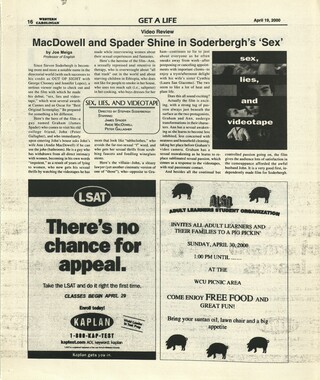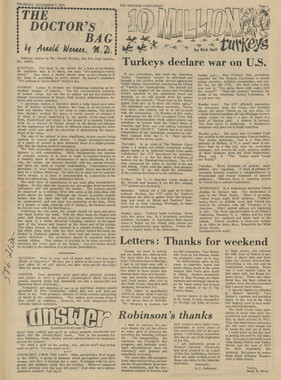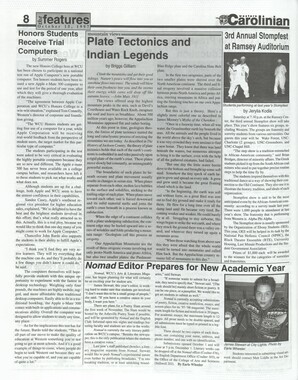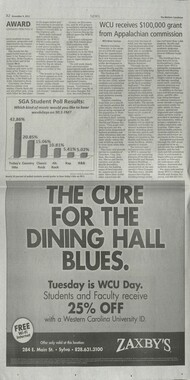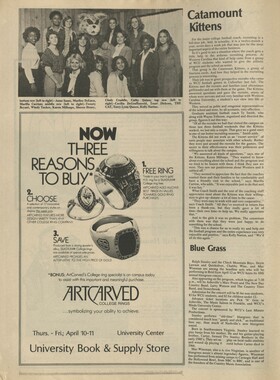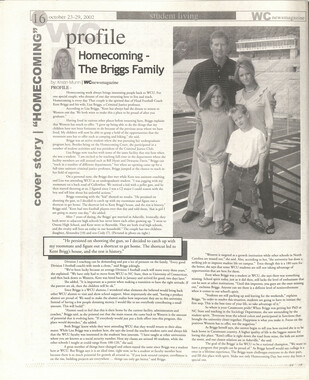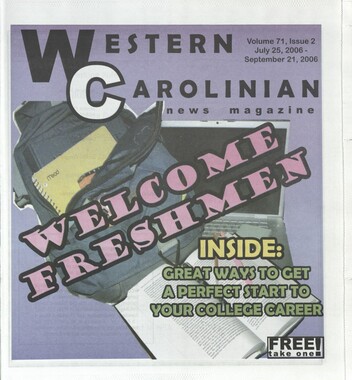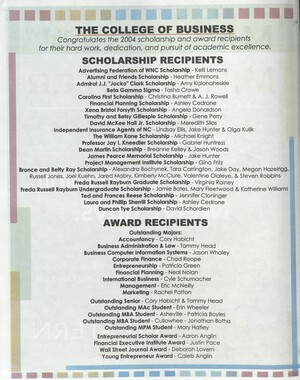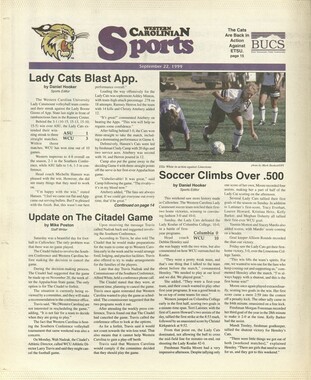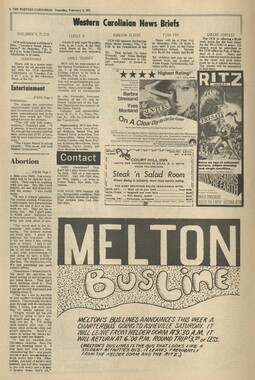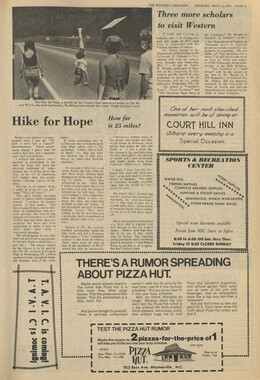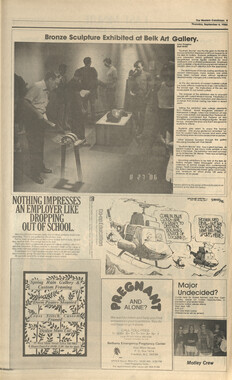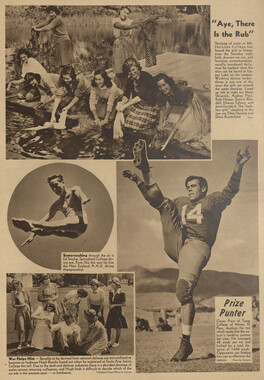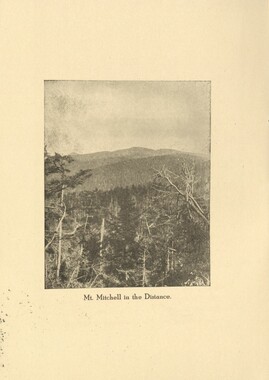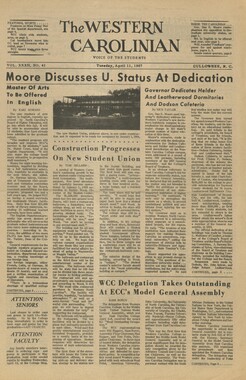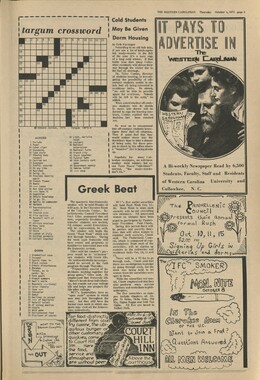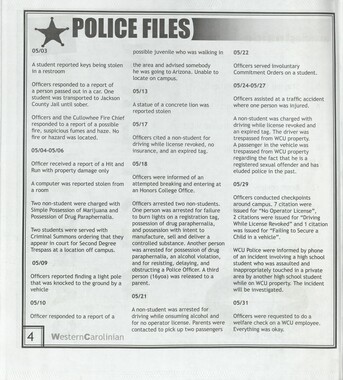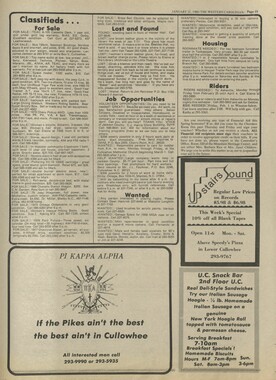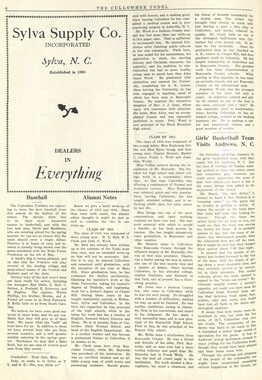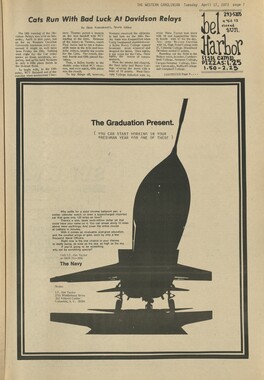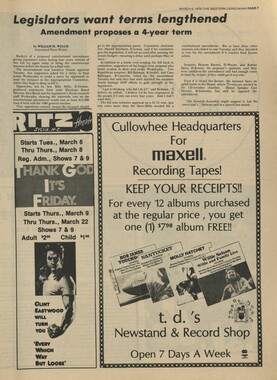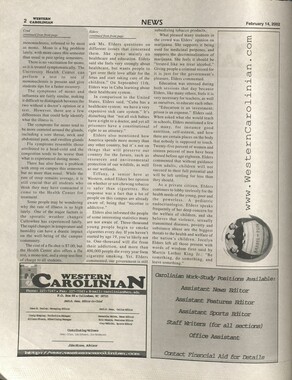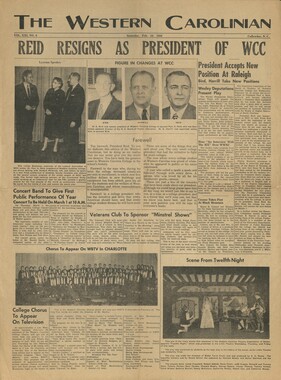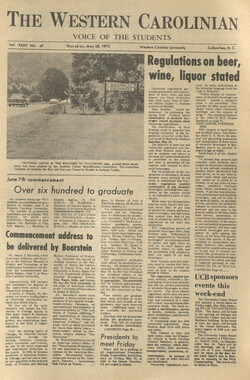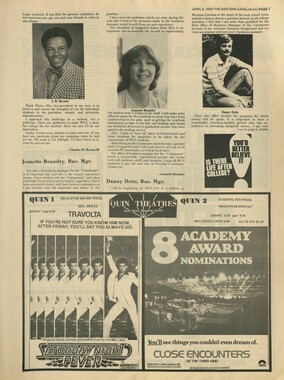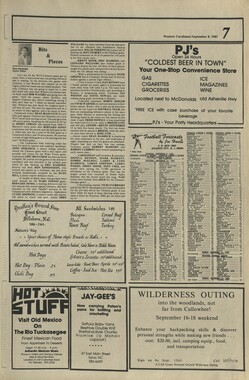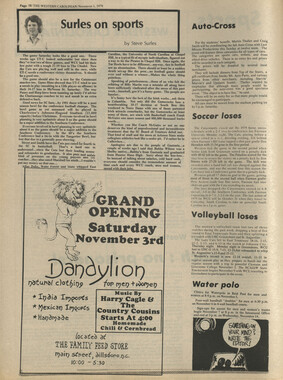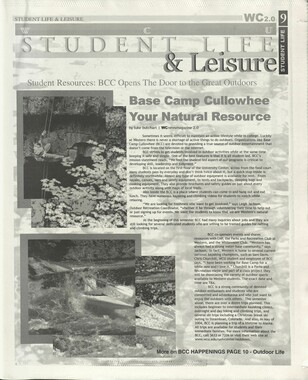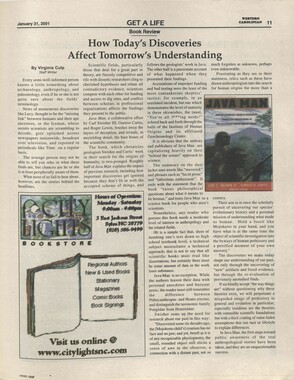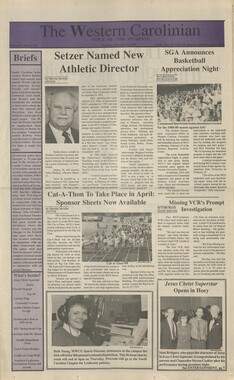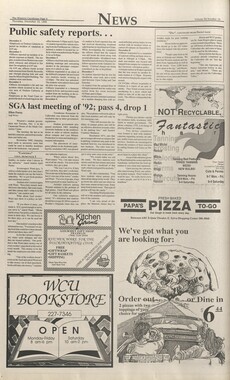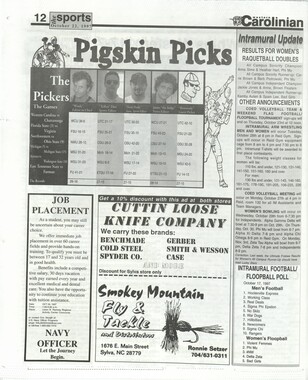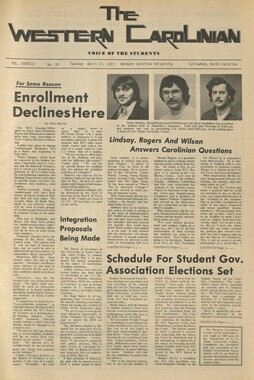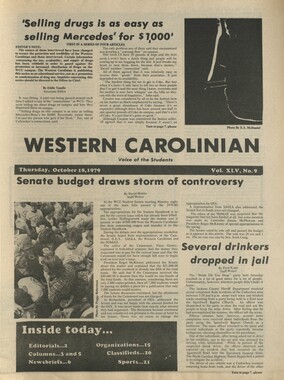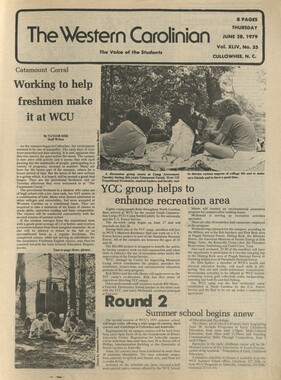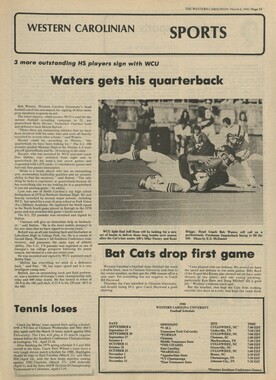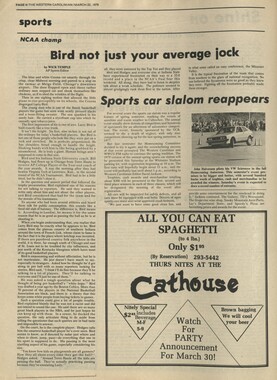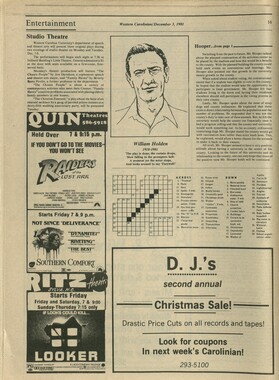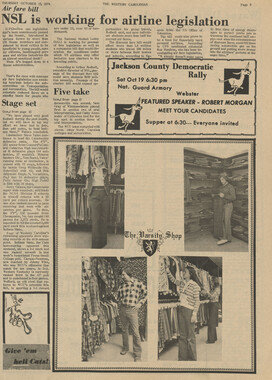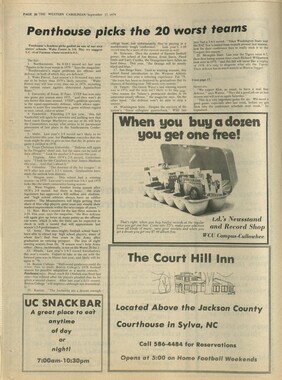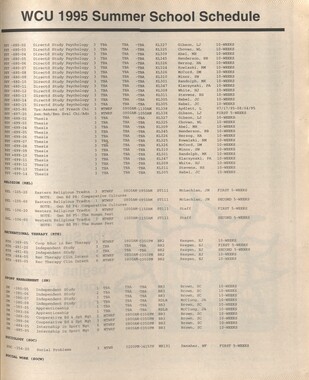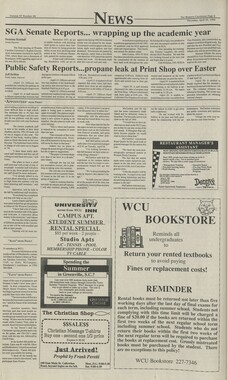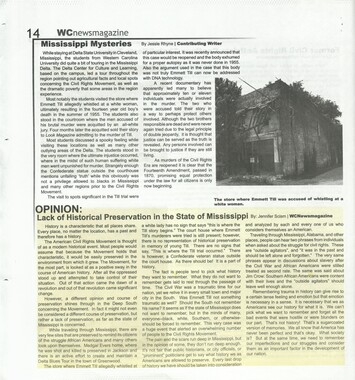Western Carolina University (21)
View all
- Canton Champion Fibre Company (2308)
- Cherokee Traditions (291)
- Civil War in Southern Appalachia (165)
- Craft Revival (1942)
- George Masa Collection (137)
- Great Smoky Mountains - A Park for America (2900)
- Highlights from Western Carolina University (422)
- Horace Kephart (941)
- Journeys Through Jackson (159)
- LGBTQIA+ Archive of Jackson County (85)
- Oral Histories of Western North Carolina (314)
- Picturing Appalachia (6797)
- Stories of Mountain Folk (413)
- Travel Western North Carolina (153)
- Western Carolina University Fine Art Museum Vitreograph Collection (129)
- Western Carolina University Herbarium (92)
- Western Carolina University: Making Memories (738)
- Western Carolina University Publications (2491)
- Western Carolina University Restricted Electronic Theses and Dissertations (146)
- Western North Carolina Regional Maps (71)
- World War II in Southern Appalachia (131)
University of North Carolina Asheville (6)
View all
- Allanstand Cottage Industries (62)
- Appalachian National Park Association (53)
- Bennett, Kelly, 1890-1974 (1463)
- Berry, Walter (76)
- Brasstown Carvers (40)
- Carver, George Washington, 1864?-1943 (26)
- Cathey, Joseph, 1803-1874 (1)
- Champion Fibre Company (233)
- Champion Paper and Fibre Company (297)
- Cherokee Indian Fair Association (16)
- Cherokee Language Program (22)
- Crowe, Amanda (40)
- Edmonston, Thomas Benton, 1842-1907 (7)
- Ensley, A. L. (Abraham Lincoln), 1865-1948 (275)
- Fromer, Irving Rhodes, 1913-1994 (70)
- George Butz (BFS 1907) (46)
- Goodrich, Frances Louisa (120)
- Grant, George Alexander, 1891-1964 (96)
- Heard, Marian Gladys (60)
- Kephart, Calvin, 1883-1969 (15)
- Kephart, Horace, 1862-1931 (313)
- Kephart, Laura, 1862-1954 (39)
- Laney, Gideon Thomas, 1889-1976 (439)
- Masa, George, 1881-1933 (61)
- McElhinney, William Julian, 1896-1953 (44)
- Niggli, Josephina, 1910-1983 (10)
- North Carolina Park Commission (105)
- Osborne, Kezia Stradley (9)
- Owens, Samuel Robert, 1918-1995 (11)
- Penland Weavers and Potters (36)
- Roberts, Vivienne (15)
- Roth, Albert, 1890-1974 (142)
- Schenck, Carl Alwin, 1868-1955 (1)
- Sherrill's Photography Studio (2565)
- Southern Highland Handicraft Guild (127)
- Southern Highlanders, Inc. (71)
- Stalcup, Jesse Bryson (46)
- Stearns, I. K. (213)
- Thompson, James Edward, 1880-1976 (226)
- United States. Indian Arts and Crafts Board (130)
- USFS (683)
- Vance, Zebulon Baird, 1830-1894 (1)
- Weaver, Zebulon, 1872-1948 (58)
- Western Carolina College (230)
- Western Carolina Teachers College (282)
- Western Carolina University (2008)
- Western Carolina University. Mountain Heritage Center (18)
- Whitman, Walt, 1819-1892 (10)
- Wilburn, Hiram Coleman, 1880-1967 (73)
- Williams, Isadora (3)
- Cain, Doreyl Ammons (0)
- Crittenden, Lorraine (0)
- Rhodes, Judy (0)
- Smith, Edward Clark (0)
- Appalachian Region, Southern (2929)
- Asheville (N.C.) (1944)
- Avery County (N.C.) (26)
- Blount County (Tenn.) (195)
- Buncombe County (N.C.) (1680)
- Cherokee County (N.C.) (283)
- Clay County (N.C.) (556)
- Graham County (N.C.) (238)
- Great Smoky Mountains National Park (N.C. and Tenn.) (525)
- Haywood County (N.C.) (3571)
- Henderson County (N.C.) (70)
- Jackson County (N.C.) (4917)
- Knox County (Tenn.) (35)
- Knoxville (Tenn.) (13)
- Lake Santeetlah (N.C.) (10)
- Macon County (N.C.) (420)
- Madison County (N.C.) (216)
- McDowell County (N.C.) (39)
- Mitchell County (N.C.) (135)
- Polk County (N.C.) (35)
- Qualla Boundary (982)
- Rutherford County (N.C.) (78)
- Swain County (N.C.) (2185)
- Transylvania County (N.C.) (270)
- Watauga County (N.C.) (12)
- Waynesville (N.C.) (86)
- Yancey County (N.C.) (72)
- Aerial Photographs (3)
- Aerial Views (60)
- Albums (books) (4)
- Articles (1)
- Artifacts (object Genre) (228)
- Bibliographies (1)
- Biography (general Genre) (2)
- Cards (information Artifacts) (38)
- Clippings (information Artifacts) (191)
- Copybooks (instructional Materials) (3)
- Crafts (art Genres) (622)
- Depictions (visual Works) (21)
- Design Drawings (1)
- Drawings (visual Works) (185)
- Envelopes (73)
- Exhibitions (events) (1)
- Facsimiles (reproductions) (1)
- Fiction (general Genre) (4)
- Financial Records (12)
- Fliers (printed Matter) (67)
- Glass Plate Negatives (381)
- Guidebooks (2)
- Internegatives (10)
- Interviews (815)
- Land Surveys (102)
- Letters (correspondence) (1013)
- Manuscripts (documents) (618)
- Maps (documents) (177)
- Memorandums (25)
- Minutes (administrative Records) (59)
- Negatives (photographs) (6090)
- Newsletters (1290)
- Newspapers (2)
- Notebooks (8)
- Occupation Currency (1)
- Paintings (visual Works) (1)
- Pen And Ink Drawings (1)
- Periodicals (193)
- Personal Narratives (10)
- Photographs (12976)
- Plans (maps) (1)
- Poetry (5)
- Portraits (4568)
- Postcards (329)
- Programs (documents) (181)
- Publications (documents) (2443)
- Questionnaires (65)
- Relief Prints (26)
- Sayings (literary Genre) (1)
- Scrapbooks (282)
- Sheet Music (2)
- Slides (photographs) (402)
- Songs (musical Compositions) (2)
- Sound Recordings (796)
- Specimens (92)
- Speeches (documents) (18)
- Tintypes (photographs) (8)
- Transcripts (322)
- Video Recordings (physical Artifacts) (23)
- Text Messages (0)
- A.L. Ensley Collection (275)
- Appalachian Industrial School Records (7)
- Appalachian National Park Association Records (336)
- Axley-Meroney Collection (2)
- Bayard Wootten Photograph Collection (20)
- Bethel Rural Community Organization Collection (7)
- Blumer Collection (5)
- C.W. Slagle Collection (20)
- Canton Area Historical Museum (2110)
- Carlos C. Campbell Collection (462)
- Cataloochee History Project (64)
- Cherokee Studies Collection (4)
- Daisy Dame Photograph Album (5)
- Daniel Boone VI Collection (1)
- Doris Ulmann Photograph Collection (112)
- Elizabeth H. Lasley Collection (1)
- Elizabeth Woolworth Szold Fleharty Collection (4)
- Frank Fry Collection (95)
- George Masa Collection (173)
- Gideon Laney Collection (452)
- Hazel Scarborough Collection (2)
- Hiram C. Wilburn Papers (28)
- Historic Photographs Collection (236)
- Horace Kephart Collection (861)
- Humbard Collection (33)
- Hunter and Weaver Families Collection (1)
- I. D. Blumenthal Collection (4)
- Isadora Williams Collection (4)
- Jesse Bryson Stalcup Collection (47)
- Jim Thompson Collection (224)
- John B. Battle Collection (7)
- John C. Campbell Folk School Records (80)
- John Parris Collection (6)
- Judaculla Rock project (2)
- Kelly Bennett Collection (1482)
- Love Family Papers (11)
- Major Wiley Parris Civil War Letters (3)
- Map Collection (12)
- McFee-Misemer Civil War Letters (34)
- Mountain Heritage Center Collection (4)
- Norburn - Robertson - Thomson Families Collection (44)
- Pauline Hood Collection (7)
- Pre-Guild Collection (2)
- Qualla Arts and Crafts Mutual Collection (12)
- R.A. Romanes Collection (681)
- Rosser H. Taylor Collection (1)
- Samuel Robert Owens Collection (94)
- Sara Madison Collection (144)
- Sherrill Studio Photo Collection (2558)
- Smoky Mountains Hiking Club Collection (616)
- Stories of Mountain Folk - Radio Programs (374)
- The Reporter, Western Carolina University (510)
- Venoy and Elizabeth Reed Collection (16)
- WCU Gender and Sexuality Oral History Project (32)
- WCU Mountain Heritage Center Oral Histories (25)
- WCU Oral History Collection - Mountain People, Mountain Lives (71)
- WCU Students Newspapers Collection (1923)
- Western North Carolina Tomorrow Black Oral History Project (69)
- William Williams Stringfield Collection (2)
- Zebulon Weaver Collection (109)
- African Americans (390)
- Appalachian Trail (35)
- Artisans (521)
- Cherokee art (84)
- Cherokee artists -- North Carolina (10)
- Cherokee language (21)
- Cherokee pottery (101)
- Cherokee women (208)
- Church buildings (190)
- Civilian Conservation Corps (U.S.) (111)
- College student newspapers and periodicals (2012)
- Dams (108)
- Dance (1023)
- Education (222)
- Floods (61)
- Folk music (1015)
- Forced removal, 1813-1903 (2)
- Forest conservation (220)
- Forests and forestry (1196)
- Gender nonconformity (4)
- Great Smoky Mountains National Park (N.C. and Tenn.) (181)
- Hunting (46)
- Landscape photography (25)
- Logging (119)
- Maps (83)
- Mines and mineral resources (9)
- North Carolina -- Maps (18)
- Paper industry (38)
- Postcards (255)
- Pottery (135)
- Railroad trains (72)
- Rural electrification -- North Carolina, Western (3)
- School integration -- Southern States (2)
- Segregation -- North Carolina, Western (5)
- Slavery (5)
- Sports (452)
- Storytelling (243)
- Waterfalls -- Great Smoky Mountains (N.C. and Tenn.) (66)
- Weaving -- Appalachian Region, Southern (280)
- Wood-carving -- Appalachian Region, Southern (328)
- World War, 1939-1945 (173)
Western Carolinian Volume 83 Number 04
Item
Item’s are ‘child’ level descriptions to ‘parent’ objects, (e.g. one page of a whole book).
-
-
A2 april 28, 2016 WCU's Sprin Madeline Moore Staff Writer Not every college student can say that their school has their very own literary festival, but _ catamounts have that privilege. From April 4-7, Western Carolina Univer- sity held its 18th annual Spring Literary Festival. The featured writers for this years festival included: poet Brent Martin; nonfiction writer Catherine Reid; poet Ma- jor Jackson; poet Lauren K. Alleyne; poet Den- ton Loving; fiction and nonfiction writer Bret Anthony Johnston; poet, fiction, and nonfiction writer Judith Ortiz Cofer; poet Darnell Arnoult; poet Jane Hicks; fiction and nonfiction writer Lee Smith and nonfiction writer Rick Bragg. In addition, Western Caro- linas very own Ron Rash (author of Serena) filled in for a cancella- tion and some student poets read during the first event. Such a wide array of writers made for a very diverse and exciting se- ries of events. Major Jacksons wit and sarcasm came through as he read poems like OK Cupid, a poem about online dating and trains of thought, which he rather reluctantly read as a request from the audience. The mastery of his craft was shown in everything he read from How to Listen to Why I Write Poetry to On Co- coa Beach, a widespread favorite. Poets Darnell Arnoult and Jane Hicks were a power duo with their ~ eloquent narrative poetry - and great advice for aspir- ing writers. Tf youre gonna _ steal, steal from the best, _ said Hicks as she ex- plained the importance of analyzing other writers _ work and learning from it. Arnoult added, Read. Always read. It helps bet- . NEWS Author Judith Ortiz Cofer with her best friend Kathryn at tthe Spring Literary Festival Photo by Breanna Taylor/STAFF g Literary Festival Professor Railsbacks Contemporary Literature class take a photo with author Brett Anthony Jackson ter your writing. Arnoult went on to give this beautiful piece of advice when telling about her experience with rejec- tion as a writer. No one can tell you how or if you can bea writer. Only you can decide whether or not you can be a writer, she said. Judith Ortiz Cofer put on quite the show with her bold personality and relatable writing. Stu- ~ dents were talking about her for days isi her reading. Ron Rash even gave insight on his opinion on the Serena film, saying that he didnt like how Serena was characterized and decided to let his chil- dren go to the premiere in his place. As mentioned before, the Spring Literary Festival has been around for thirteen years and it is expected to be around for many more. Pamela Duncan, the director of the festival, gave some insight into its history and background. Dr. Brian Railsback, . former head of the WCU English Department, spearheaded the launch of the Spring Literary Festival as part of a re- newed effort to stimulate . interest among students and residents of western North Carolina in the work of contemporary writers and poets, said Duncan. In regards to the first festival in 2003, Railsback has. been quoted saying, The festival will give those who love to read and those who love to write a chance to meet and interact with nation- ally acclaimed poets and writers. (Information disclosed by Duncan). When asked about the process of choosing and inviting writers, Dun- can said that, Authors for the festival are rec- ommended by English Department faculty and others across campus and in the surrounding: com- munities. Duncan continued, WCUs own Ron Rash has been instrumental in bringing well-known writers like Colum Mc- Cann, Andre Dubus III and Rick Bragg to our festival. If youre curious about next years festival, Dun- can says that it is sched- uled for April 3-6. Tt will feature keynote author Billy Collins, a for- mer poet laureate of the United States, she said. Renowned South African writer, Sindiwe Magona is also eenectet to be there. The Spring Liteey Festival provides so much opportunity for Western Carolinas students and faculty, ds well as mem- bers of the Cullowhee and Senior Sandra Nikula with newly purchased book The Western Carolinian "Photo by Breanna ita Photo by Breanna Taylor/STAFF Sylva community. While the Spring Liter- ary Festival is important as an educational oppor- tunity, it is also important because it helps to build community among WCU students, faculty and regional residents. All these folks are brought together by a love of words, story, language, literature and learning, said Duncan. Students are encour- aged to get involved with the festival and can volunteer to help orga- nize and work the events. Anyone who is interested in getting involved can contact Pamela Duncan at pyduncan@email.wcu. edu. NCUR takes place at UNC Asheville April % 9 Jordan Freeman Junior Editor From April 7-9, the National Conference for Undergraduate Research, or NCUR for short, hosted their 30th annual confer- ence at the University of North Carolina at Asheville. The purpose of the conference is to promote undergraduate research, scholarship and creative activity for students in every field of study. The conference had more than 4,000 stu- dents and faculty mem- bers in attendance, with more than 100 students from Western Carolina University presenting their own respected research to students and faculty from both UNCA and other visit- ing colleges. According to a resi- dent student, UNCA had cancelled all class- es in accordance for the event but they had to go to a certain number of events to get credit for their classes. The basic run down of the three-day confer- ence was as follows: students would present their work in about a 20 minute time pe- riod where they would spend 15 minutes dis- cussing their research, either by reading their paper toaclassroom | sized audience or presenting their find- ings via PowerPoint or handouts. The last five minutes were used for either fellow present- ers, visiting or resident students, or faculty members to ask the pre- senter questions about their research. Students from all over the country have opportunities to partici- pate in NCUR, allowing for a wonderful experi- ence of meeting new people if you attend. Anthony Ross, a senior at the Univer- sity of North Carolina at Greensboro, was presenting his paper Transitive Power: The Relationship Between Unions and Social Jus- . tice Group Mobility, which discusses how the decline of unions in the United States of America coincides with the rise of social justice groups, talked about how he got into NCUR. My adviser casually mentioned the confer- ence to me, saying he thought my paper would be good enough to enter. So we worked out the details (his research and abstract) and we submitted it. It wasnt until I had already been accepted to the conference that Trealized how big of a deal it was, said Ross. In addition to pre- senting their work, stu- dents have the option of submitting their re- search to be published in the Conference Proceedings, which is proceeded annually by UNCA and distrib- uted to institutions all over the nation. Also, presenters get the opportunity to have faculty outside of their institutions to read and comment on their work, giving them the chance to enhance their paper for submission to other sources in their fields and publications can be used in their: resumes when applying to graduate school. Makayla Smith, a sophomore from West- ern Carolina, presented her paper, The Wan- derer: Questions in Consolation, which focused on the theory that by adding the first four opening lines and the last five lines in the poem The Wanderer, it makes it a Christian poem as opposed to a Pagan poem. She dis- cussed how she submit- ted her paper to NCUR. T did my paper for my [British Literature] class with Dr. Fenton. I found the paper a bit of a task as the most current research for the poem was from 1966, but, after a few mo- ments of struggle, I was able to get the paper done. Dr. Fenton pulled me into her office and told me how much she enjoyed my paper, tell- ing me I should sub- mit it to NCUR. After a bit of discussion, I agreed to do it. It was then I found out that NCUR stopped taking in submissions the very next day. The two of us quickly edited the paper and came up with an abstract, submitting the paper at the very last possible moment. Once I was accepted to the conference, I went from being stressed about writing the paper to stressed about pre- senting the paper, said Smith. She continued on to talk about her presenta- tion, stating, I wasnt expecting the turn out I received as I thought I was the only one who cared about the poem. However, it still wasnt as bad of an experience Photo by Jordan Freeman/STAFF Western Carolina University student Makayla Smith pre- senting at NCUR as I was expecting it to be. Though the organiza- tion has not posted any information as to when undergraduate stu- dents can start submit- ting their research to the conference in 2017, they have announced that the next confer- ence will be held at the University of Memphis in Memphis, Tennessee. For more information about NCUR and the larger CUR (Conferenc- es on Undergraduate Research), you can visit www.cur.org.
Object
Object’s are ‘parent’ level descriptions to ‘children’ items, (e.g. a book with pages).
-
The Western Carolinian is Western Carolina University's student-run newspaper. The paper was published as the Cullowhee Yodel from 1924 to 1931 before changing its name to The Western Carolinian in 1933.
-
